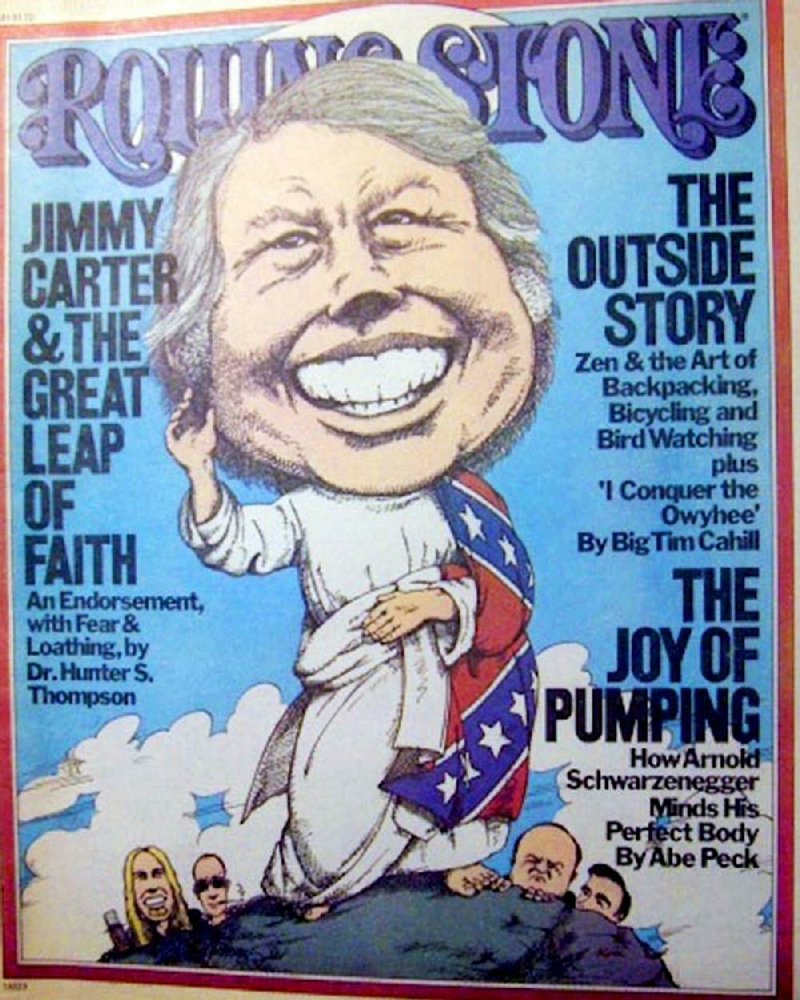I couldn’t vote for Jimmy Carter in 1976. My November birthday fell a couple of weeks too late for me to do that. But I volunteered for him; it was the first and last political campaign for which I ever worked. I believe I delivered some yard signs.
Working for Carter was a cool thing to do the summer after I graduated from high school and, freed from a Draconian dress code, grew my hair to my shoulders. He’d come from seemingly nowhere the year before, a relative outsider who no doubt benefited from public exhaustion with politics in the wake of the Watergate scandal. The peanut farmer from Georgia was the rock ’n’ roll candidate who quoted his “friend Bob Dylan.” While cases might be made for Bobby Kennedy and Bill Clinton, Carter’s candidacy was the closest ’60s counter-culture ever came to engaging the established political infrastructure.
In June Rolling Stone put a caricature of him on its cover, accentuating his beaming grin and longish gray hair. He was dressed in a white tunic, like Christ or Moses, with what should correctly be identified as the Battle Flag of Northern Virginia draped over his left shoulder. He was standing on a hilltop with the heads of Gregg Allman and Hunter S. Thompson poking up like daisies on his right, and what I assume are caricatures of the Republican nominees—President Gerald Ford (though it looks more like J. Edgar Hoover) and an impossibly young Bob Dole.
Thompson had written the cover story, headlined “Jimmy Carter & The Great Leap of Faith.” The piece was basically an account of the 1974 Law Day speech at the University of Georgia that helped put Carter on the national political stage, laced with typically Gonzo fantasies about what he discovered when he opened the trunk of a Secret Service car to retrieve (long story) a quart of bourbon.
HST objected to the subhead Rolling Stone’s Jann Wenner appended to the piece—“An Endorsement with Fear & Loathing,” a marketing ploy that played off one of Thompson’s signature locutions—on the grounds his piece wasn’t an endorsement. Raoul Duke was, for all his hallucinatory hyperbole, still a journalist. But you could tell the wicked old fraud was genuinely impressed by Carter, and near the end of the piece he comes dangerously close to sincerity:
“… many of the people who feel so strongly about keeping Jimmy Carter out of the White House don’t know him at all. And a lot of the people who accuse him of lying, dissembling, waffling and being ‘hazy’ have never bothered to listen very carefully to what he says, or to try reading between the lines now when [he says] … ‘I just want to see us once again with a government that is as honest and truthful and fair and idealistic and compassionate and filled with love as are the American people.’
“The first time I heard him say that up in New Hampshire I was stunned. It sounded like he had eaten some of the acid I’ve been saving up to offer him the first time he mentions anything to me about bringing Jesus into my life … But after I’d heard him say the same thing five or six more times, it began to sound like something I’d heard long before I’d ever heard Jimmy Carter’s name…
“It took me a while to dig it out of my memory, but when it finally surfaced I recognized the words of the late great liberal Adlai Stevenson, who once lashed it all together in one small and perfect capsule when he said, ‘… in a democracy, people usually get the kind of government they deserve.’”
People like to say everything is political, and to a point they are right. Any act of volition can be imbued with a political purpose. But it is not so important as those of us invested in its coverage pretend. For most people in this country with the wherewithal to read a Sunday newspaper, politics is a diversion, something we can choose to follow or not.
As much as we like to embue these contests with drama—as much as we like to shout—the differences between candidates in this country is slight. The slow murder of the middle class might be quickened by our next president, but none of us will be saved by politics.
I don’t consider myself a “political columnist” for the same reasons someone like Ta-Nehisi Coates might object to being called a “black” writer, because any modifier can be seen as limiting. Politics is a minor part of my life; I have no litmus tests for friends. I understand the importance of engaging in civic life. But I agree with Hannah Arendt that “the meaninglessness in which politics finds itself is evident from the fact that all individual political questions now end in an impasse.”
I would rather write about other things. Like what a long strange trip it’s been. Over the years, I have managed to have moments with everyone who was depicted on that Rolling Stone cover. I have talked with Jimmy Carter about poetry.
I couldn’t vote for him in 1976. I wish I could vote for that Jimmy Carter now.
pmartin@arkansasonline.com
Read more at
www.blooddirtangels.com
